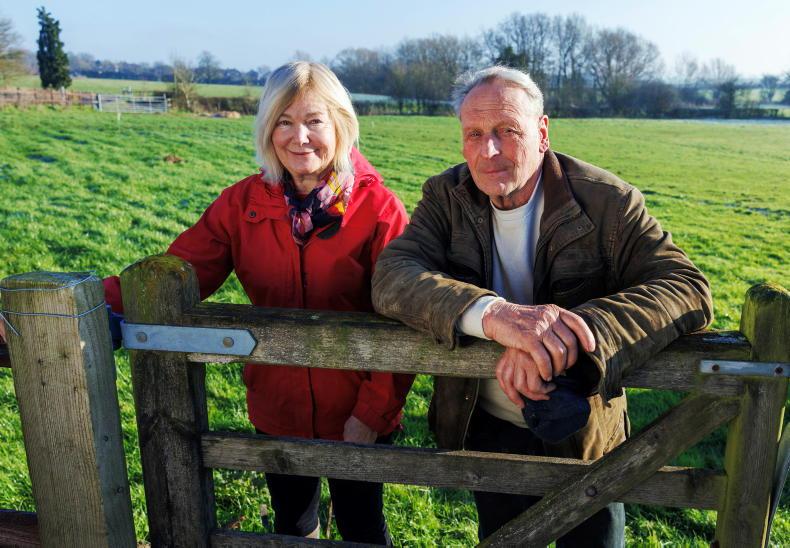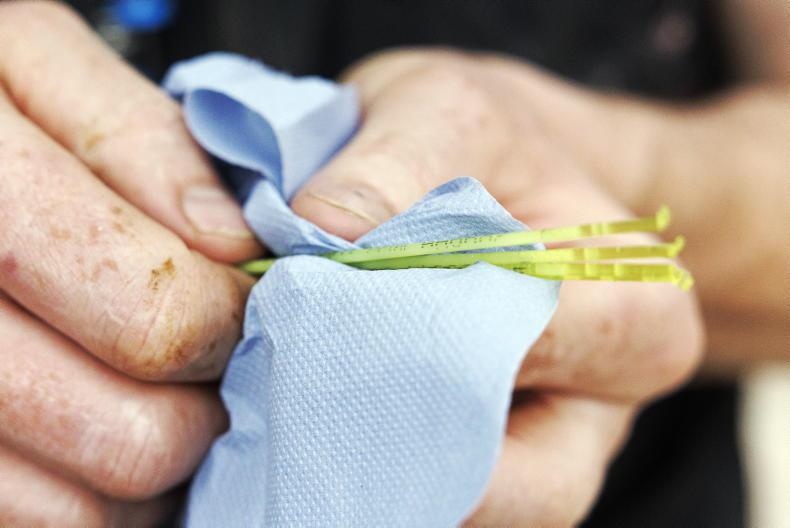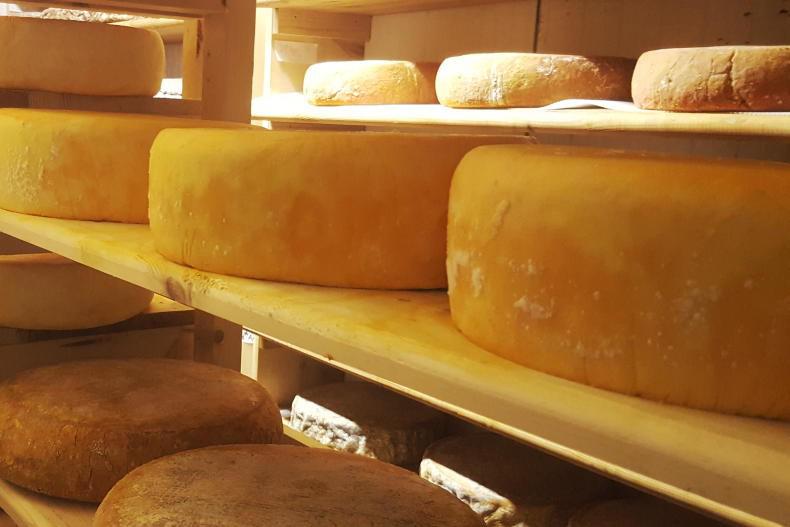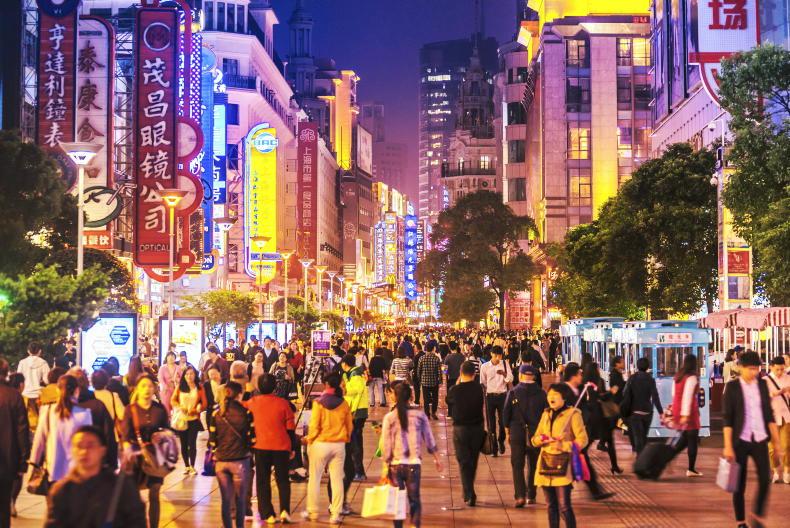The threat of US tariffs against Irish agri-food exports - a live prospect since an emboldened and radicalised Donald Trump returned to the White House - finally became reality this week.
It could have been worse - the 20% tariff is mid-range between the baseline 10% and the punitive tariffs imposed on the likes of China and Vietnam.
And the exclusion of pharmaceutical products for now is good news for the overall economy.
It could have been a lot better for food production and agriculture. The 20% tariffs on dairy products and spirits look even worse when we consider that our main competitors in those sectors - New Zealand for dairy, the UK for spirits - will only have a 10% tariff - the baseline - imposed on them.
We thus lose competitiveness against domestic and other imported product. With almost €2bn of Irish agri-food exports to the US last year, it could be portrayed as a €400m hit to the sector.
Using the "Trump Trade magic maths", perhaps much more.
So where are we, and how should Ireland and the EU react?
Unprecedented times
To answer the first question, we are in unprecedented times. We need to recognise that the US is unrecognisable, falling far and fast from its self-defined status as the leader of the free world.
And giving Donald Trump, his regime and his base easy wins will only hasten that journey. We will all suffer for that in the long run.
So my answer to the second question is that it would be much better that we show willingness to take some economic pain now, while showing the US that it cannot bully the rest of the world.
If that means imposing tariffs back on US exports, so be it. If it means other economic instruments of retaliation, I’ll offer my support for them too. It would be ludicrous to allow a country with 340 million people to dictate the terms of trade the other 7.8 billion people on the planet.
It's important to understand that the whole process of determining tariffs was founded in a belief that countries that export more to the US than they import from it are somehow cheating.
The consensus is that the “reciprocal” tariffs were negotiated by calculating the ratio between total exports and total imports between the US and each country as a percentage and then imposing tariffs at half that percentage.
US jobs were given away
Donald Trump may genuinely believe that the US has been taken advantage of in recent decades. Another narrative would say that the decision to take manufacturing and services out of the United States was made by the owners and the CEOs of big companies.
Moving to countries with lower production costs improved shareholder revenues and boosted CEO pay and bonus payments.
The Michael Moore film Roger and Me is a superb exposition of this phenomenon. A documentary made in the 1980s, it chronicles the collapse of the local economy in his hometown of Flint Michigan, following the closure of the General Motors (GM) production facility there.
The Roger in question is Roger Smith, then-CEO of GM. Donald Trump has much more in common with Roger Smith than he does with the autoworkers of Flint Michigan, but he has their overwhelming support right now and autoworkers from Michigan were part of the supporting cast on the White House lawn on Wednesday.
US farmers were victims of the same forces of globalisation in the 1980s as car workers. As trade barriers were steadily pulled down by the General Agreement on Tariffs and Trade (GATT) and its successor the World Trade Organisation (WTO), food and agriculture commodity prices fell toward third world prices.
The same thing happened here in Europe and farmers have had to adjust, as production incentives were stripped out of the Common Agricultural Policy (CAP).
Donald Trump and his administration say that the EU still has trade barriers, in the form of bans on beef where growth promoters have been administered and genetically modified organisms (GMO).
The EU’s position is that these are standards imposed for the safety of human health and environmental well-being and apply to EU farmers as well as those from the US and other exporting nations.
Indeed, European farmers would feel that when it comes to GMOs, we are particularly disadvantaged. The production of GMO crops is prohibited across the EU, but the importation of GMO crops is permitted, once the GM event involved for each variety of each crop has been approved by SCOFCAH, the EU’s scientific committee tasked with this role.
The EU’s production ban remains, despite growing evidence that where the modification does not include the introduction of foreign genetic material, but merely unlocks the plant’s own latent genetic potential - there is nothing to fear and much to gain from this technology.
So it’s actually the EU’s farmers who lose out due to the GMO prohibitions within the EU. Environmental standards, such as those being advanced by European farmers in relation to South American beef in the Mercosur saga, are sure to be dismissed by the Trump administration, who have again withdrawn the US from the Paris agreement on climate change.
Three-phase plan of aggression
I firmly believe that if Donald Trump is not confronted, he will see his tariff strategy as a resounding success, as will his base that he achieved significant incremental gains by being aggressive and domineering.
And the lesson that he will learn from this is that being aggressive and domineering when you are the largest economic power in the world works.
The US now hopes that individual countries come looking for concessions and that in each negotiation, he will hold the trump card as the bigger economic player.
The alternative scenario is a co-ordinated response by other nations to the Trump tariffs. The EU, the UK, Norway, Canada, Japan, South Korea, Australia and New Zealand have a combined economy that dwarfs that of the US.
If they come together, they can negotiate from a position of strength, but may first have to inflict genuinely reciprocal pain in the form of tariffs or other economic instruments.
Last Wednesday’s actions can be clearly seen as phase two of a concerted and deliberate campaign of aggression
We’re only 10 weeks into the four years of Donald Trump’s second term, but last Wednesday’s actions can be clearly seen as phase two of a concerted and deliberate campaign of aggression.
Firstly, we had diplomatic aggression - this ranged from the trite (the demand to rename the Gulf of Mexico) to the extremely serious.
The ganging up of JD Vance and Donald Trump on Volodymyr Zelenskyy in the White House in front of the world’s media was genuinely shocking, as was the crassness of the 'Trump Gaza' video he shared on social media.
Any assertion that he intends to annex Gaza and turn it into a luxury holiday resort might seem farcical, but don’t forget it involves the effective dispossession of over two million people of their homes.
We have also seen the withdrawal of military and economic support of Ukraine, as well as the statement that Trump would do exactly what Putin was doing - relentlessly bombing a more defenceless Ukraine, were he in Putin’s position.
There was the constant disrespect of Canada, describing it as a state rather than a country, and the prime minister Justin Trudeau as a governor.
Interestingly, this language changed when Mark Carney became prime minister, who took a very hard line with the US.
Donald Trump immediately showed Canada and Mark Carney a modicum of respect. The Trump administration disparages Europe as a failed political and economic entity - woke, weak and worn out.
Let's talk about Greenland
And then there's Greenland. Donald Trump talks about Greenland like it's a property he wants to occupy, either by buying it from Denmark or just by taking it. He's treating politics as if it were the board game Monopoly - or perhaps Risk.
Last Friday week, he sent vice-president JD Vance to a US military base on Greenland to state that Denmark has not been good for Greenland and that the United States will be better for Greenland.
The narrative from the US government is that Greenland is a strategic necessity for the United States, to defend itself against Russia and also China. This can only be seen as an act of diplomatic aggression and hostility.
The Trump administration will feel that their campaign of diplomatic aggression was almost completely successful. And now they will feel they are on the front foot on their campaign of trade aggression.
It won’t end if objectives are being met, and gains are being made. Donald Trump will be emboldened and his base will be emboldened.
I believe that Trump's base are being conditioned now to be willing to accept short term gain for long term pain
There are those who say that the sharp falls on the US stock exchange will, in themselves, put pressure on the Trump administration to lessen the pain on the base and row back on the tariffs.
I think this is a misreading of the situation. I believe that Trump's base are being conditioned now to be willing to accept short term gain for long term pain.
They will be particularly willing to accept economic pain if they see that the other side, which increasingly appears to be the European Union among others, is hurting more. Trump himself certainly won’t care unless he is personally affected.
So even if doing nothing eventually results in Donald Trump slowing down, stepping back or retracting some of his tariffs and trade aggression, it’s the wrong strategy. He will see that he is setting the agenda and that others are powerless to stop him doing what he wants, when he wants - whether that is putting tariffs in place or removing them.
Military supremacy the next step?
Does it matter? Well, yes it does. Because the logical next step for the Trump administration will be to use its military supremacy, which is far more real than its economic pre-eminence, to bend the world to its will. How long will it be before the territorial claims to Greenland become the focus?
If Europe stops short of answering economic aggression, Donald Trump will be confident that Europe won’t do a thing should he take Greenland by force. That might sound fantastical, but people keep saying he won’t do the things he threatens to do, yet he keeps doing them.
If Trump's base are willing to accept short-term pain, then I fear that we must be too. We're going to have to stand up to Donald Trump and display a willingness to take what comes with that.
We can we've seen it happen many times before in history, where the threat of military aggression and the demonstration of military might is followed by invasion, occupation and annexation. Think Napoleon, Hitler, Mao and China in Tibet and most recently Putin.
Mention of Hitler and the Nazis is generally discouraged when discussing lessons of history - it's considered a step too far.
And yet, we have seen the right wing of the US Republican Party and its backers doing just that, repeatedly, in recent months.
Staggering quotation
This week, we had a US congressman describing and quoting Josef Goebbels. Keith Self was born in 1953, in the shadow of World War II. He was born into an army family, so his father would have served in World War II, fighting against Goebbels and the Nazis.
It’s staggering that he would feel it appropriate to quote Hitler’s propaganda minister, his most fanatical supporter, the man whom Hitler chose as his successor in his will.
Goebbels only served a single day as chancellor of Germany following Hitler’s suicide. He and his wife Magda poisoned their six children and then committed suicide together. Quoting Goebbels is a political act, one of either staggering lack of awareness and stupidity or a deliberate ratcheting up of an extreme agenda.
And what was the quote of Josef Goebbels that Keith Self used? “It is the absolute right of the state to supervise the formation of public opinion.”
This is the philosophy of totalitarianism. The context, Self claimed, was that he was characterising the actions of a short-lived quango of the Biden administration, one designed to counter misinformation, as it happens, as resembling a wing of a totalitarian state. But, as is increasingly the case, you have to ask if this is all part of the normalisation of such references.
I wonder how Keith Self can square his opposition to the “state’s formation of public opinion” with the fact that, right now, under the Trump administration, helmeted government agents are arresting people protesting on behalf of the Palestinian people. It’s the kind of thing we are used to seeing in Russia or China.
While Keith Self admitted that Goebbels was “a literal Nazi” best not quoted, he followed up later this week with these words regarding Donald Trump: “Every successful revolution requires a courageous articulate leader. I believe that at some point regime survival will be paramount.”
This is very odd, the kind of thing you expect to hear in Russia or China. It’s the language that precedes totalitarianism.
That’s just the latest example, there has been a steady flow of Nazi-adjacent activity among the MAGA mob, from Elon Musk and Steve Bannon using the “Roman salute”( which is the Nazi salute) at meetings to comparisons by Musk and Peter Thiel of the United States under Joe Biden to the pre-Nazi Weimar republic.
Many of the 6 January insurrectionists are white supremacists who openly display Nazi and Nazi-like imagery, from flags to tattoos.
Peter Thiel is a particularly interesting character and, for me, an extremely dangerous one. You may never have heard of him. German-born, he was the founder of Paypal and the first outside investor in the fledgling Facebook.
He is a very successful and intelligent man. He is regarded as the man who has bankrolled the political rise of US vice-president JD Vance, so he also has real political clout.
Peter Thiel is obsessed with Lord of the Rings. His current crop of companies are named in homage to those books. His main company is Palantir Technologies, named after the seeing stones developed by ancient civilisations as remote communications devices - early smartphones, if you like. Interestingly, these devices were used by the dark lord Sauron to corrupt leaders of the free world and bend them to his will.
Last year, newly-elected Social Democrats TD Eoin Hayes was suspended by his party over his former employment by Palantir, his ownership of shares in that company and the timeline around his divestment of those shares. This became an issue because Palantir is a strategic partner of the Israeli defence ministry.
Peter Thiel, comparing the US in 2024 to pre-Nazi Germany, said: “Liberalism is exhausted, one suspects that democracy, whatever that means, is exhausted, and that we have to ask some questions very far outside the Overton window."
The Overton window is the term for what is regarded as politically acceptable discourse. What Thiel means is that if the strong leadership the US needs cannot be delivered through democracy, it must be delivered by other means.
“The US is not a democracy, it is a republic,” he has also said, as if these things were mutually exclusive, when historically they have been in alignment - government of the people, by the people's elected representatives.
Peter Thiel and people who think like him people have an agenda that is extreme and they are now in charge.
Wednesday was called “Liberation Day” by Donald Trump and his cronies. For the rest of us, Libation Day might have been more in order, as a stiff drink was needed to swallow the full implications of Trump's actions.
We may have to accept that the bitter chalice of a trade war is only avoidable if we want to risk an emboldened Trump administration escalating its campaign of aggression on former allies in the western world.










SHARING OPTIONS